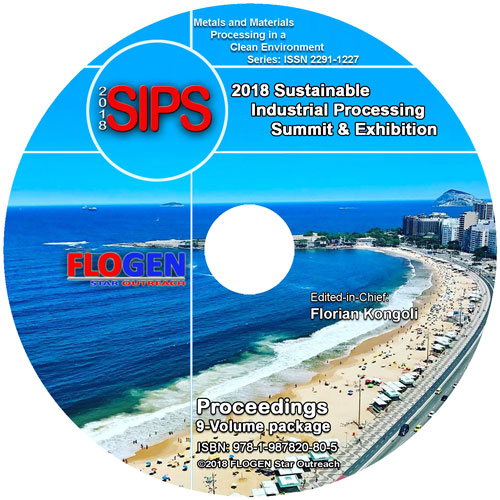2018-Sustainable Industrial Processing Summit
SIPS2018 Volume 5. Zehetbauer Intl. Symp. / SISAM
| Editors: | F. Kongoli, S. Kobe, M. Calin, J.-M. Dubois, T. Turna |
| Publisher: | Flogen Star OUTREACH |
| Publication date: | 23 December 2018 |
| Pages: | 154 pages |
| ISBN: | 978-1-987820-90-4 |
| ISSN: | 2291-1227 (Metals and Materials Processing in a Clean Environment Series) |

CD shopping page
Lifetime and Reliability of Small-scaled Multilayered Structures
Golta Khatibi1; Bernhard Czerny1; Thomas Walter1; Agnieszka Betzwar1; Martin Lederer1;1TU WIEN, Vienna, Austria;
Type of Paper: Invited
Id Paper: 407
Topic: 42
Abstract:
Small-scaled materials are used in a broad range of applications, from microelectronic systems to medical devices with a continuous trend towards further down-scaling and function integration. The micro-systems are composed of networks of interfaces separating layers of dissimilar materials with a broad range of chemical, physical and mechanical properties. Interfaces have been recognized as potential sites of failure as a result of incompatibility and thermal mismatch in the multilayered materials. Knowledge of fatigue and degradation behavior and understanding the related micro-mechanism of damage with respect to microstructural characteristics of the constituent materials with focus on their interfaces is a prerequisite for design and fabrication of functional and reliable devices. The common practice for reliability assessment and lifetime estimation of electronic devices are accelerated passive and active thermal cycling tests. In the recent years device manufactures are seeking for highly accelerated and realistic reliability assessment methods to respond to the requirements of the rapidly growing technology and keeping up with market demands. In this context, accelerated isothermal fatigue testing has been introduced as an efficient alternative to conventional thermal procedures. A considerable reduction of testing time is achieved by using dedicated high frequency mechanical fatigue testing set-ups in order to replace the thermally induced strains by equivalent mechanical strains. Based on a physics of failure approach, the relevant failure modes in the material interfaces are induced enabling detection of weak sites of the devices in a very short duration of time. Detailed microstructural investigations and failure analysis provide insights into the micro-mechanism of deformation. On the basis of experimental data and numerical methods, the proposed method is used for prediction of lifetime and delamination growth behavior of small scaled multilayered structures. In this talk, exemplary studies on the application of accelerated isothermal mechanical fatigue testing for lifetime assessment of small scaled interconnects and thin multilayered structures are presented and the advantages and limits of the proposed method is briefly discussed.
Keywords:
Adhesion; Advanced materials; Electronic structures; Surfaces and interfaces;References:
G. Khatibi, B. Czerny, A. Lassnig, M. Lederer, J. Nicolics, J. Magnien, E. Suhir, A Novel Approach for Evaluation of Material Interfaces in Electronics, IEEE 2016, Aerospace ConferenceA. Lassnig, R. Pelzer, C. Gammer, G. Khatibi, Role of intermetallics on the mechanical fatigue behavior of Cu-Al ball bond interfaces, Journal of Alloys and Compounds, 646 (2015) 803 - 809
B. Czerny, M. Lederer, B. Nagl, A. Trnka, G. Khatibi, M. Thoben, Thermo-mechanical analysis of bonding wires in IGBT modules under operating conditions, Microelectronic Reliability 52 (2012) 2353-2357
B. Czerny, G. Khatibi, Interface Reliability and Lifetime Prediction of Heavy Aluminium Wire Bonds, Microelectronics Reliability 58 (2016) 65-72
J. Magnien, G. Khatibi, M. Lederer, H. Ipser, Investigation of interfacial behavior in miniaturized solder interconnects, Materials Science & Engineering A 673 (2016) 541-550
T. Walter, M. Lederer, G. Khatibi, Delamination of polyimide/Cu films under mixed mode loading, Microelectronics Reliability 64 (2016) 281-286
A. Mazloum-Nejadari, G. Khatibi, B. Czerny, M. Lederer, J. Nicolics, L. Weiss Reliability of Cu Wirebonds in Microelectronic Packages, Microelectronics Reliability 74 (2017) 147-154
A. Betzwar Kotas, G. Khatibi, Isothermal bending fatigue response of solder joints in high power semiconductor test structures, Microelectronics Reliability 85 (2018) 1-11